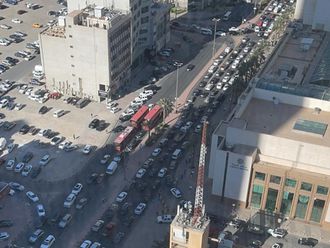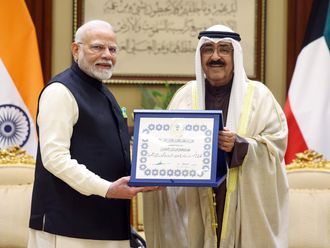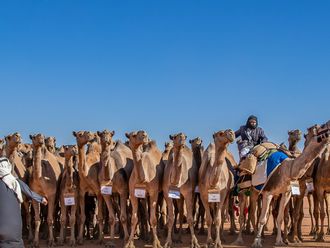Rome: A private rescue ship carrying 629 migrants remained at sea Sunday evening after more than a day of not receiving permission to dock in either Italy or the small Mediterranean island nation of Malta.
Aid group SOS Mediterranee said the passengers on its ship, the Aquarius, included 400 people who were picked up by the Italian navy, that country’s coast guard and private cargo ships and transferred. The rescue ship’s crew itself pulled 229 migrants from the water or from traffickers’ unseaworthy boats Saturday night, including 123 unaccompanied minors and seven pregnant women.
The Aquarius and its passengers were caught up in a crackdown promoted by the right-wing partner in Italy’s new populist government, which has vowed to stop the country from becoming the “refugee camp of Europe.”
Italian Premier Giuseppe Conte said he personally contacted Malta’s prime minister, Joseph Muscat, to “explicitly at least take on the human assistance of persons in difficulty aboard the Aquarius.”
But Muscat, “while comprehending the situation,” rebuffed him, Conte said in a Facebook post late Sunday. That stance “confirms the latest unwillingness of Malta and, thus, of Europe, to intervene and take care of the emergency.”
Like Malta, Italy didn’t appear to be budging.
Italy’s firebrand interior minister, Matteo Salvini, who leads the anti-immigrant League party in the governing coalition, has long railed against what he depicts as Europe’s failure to show solidarity with Italy during the migrant crisis in recent years.
“Starting today, Italy, too, begins to say NO to the trafficking of human beings, NO to the business of clandestine immigration,” Salvini tweeted Sunday.
After leading an hours-long meeting with his coalition leaders Sunday night at the premier’s office, Conte said Italy was sending two motorboats with medical staff aboard in case the migrants needed help but he made no mention of how the Aquarius might ever get into port.
Salvini and Italian Transportation Minister Danilo Toninelli, who is part of the 5-Star Movement faction in the new government, said in a joint statement Sunday that it was Malta’s responsibility to “open its ports for the hundreds of the rescued on the NGO ship Aquarius.”
“The island can’t continue to turn the other way,” the ministers said. “The Mediterranean is the sea of all the countries that face it, and it [Malta] can’t imagine that Italy will continue to face this giant phenomenon in solitude.”
Earlier, Malta said in a statement that the Aquarius took on the passengers in waters controlled by Libya and where Italian authorities in Rome coordinate search-and-rescue operations.
The Maltese Rescue Coordination Center “is neither the competent nor the coordinating authority,” the statement said.
SOS Mediterranee spokeswoman Mathilde Auvillain said the ship was “heading north following instructions received after the rescues and transfers” Saturday night. The Rome-based rescue coordination centre gave the instructions.
The aid group said in a statement it had taken “good note” of Salvini’s stance, as reported earlier by Italian media. It added that the Aquarius “is still waiting for definitive instructions regarding the port of safety.”
SOS Mediterranee said Maltese search-and-rescue authorities were contacted by their Italian counterparts “to find the best solution for the well-being and safety” of the people on the ship.
Farther west in the Mediterranean, Spain’s maritime rescue service saved 334 migrants and recovered four bodies from boats it intercepted trying to reach Europe over the weekend. The rescue service said its patrol craft reached nine different boats carrying migrants that had left from Africa on Saturday and early Sunday.
One boat found Sunday was carrying four bodies along with 49 migrants. The cause of death was yet to be determined.
To the east, Libya’s coast guard intercepted 152 migrants, including women and children, from two boats stopped in the Mediterranean off the coast of the western Zuwara district Saturday. The migrants were taken to a naval base in Tripoli.
Human rights groups oppose returning rescued migrants to Libya, where many are held in inhumane conditions, poorly fed and often forced to do slave labour.
Libya was plunged into chaos following a 2011 uprising. The lawlessness in Libya has made it a popular place for migrants to try to depart for Europe.
Driven by violent conflicts and extreme poverty, hundreds of thousands of migrants have reached southern Europe in recent years by crossing the Mediterranean in smugglers’ boats that often are unseaworthy.
The United Nations says at least 785 migrants have died crossing the sea so far this year.











